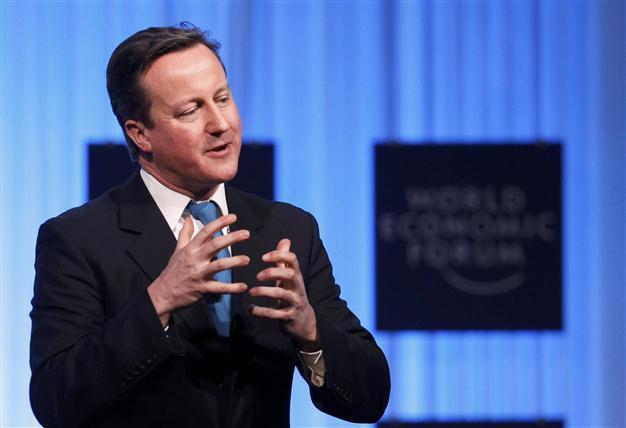UK's Cameron calls for the 'coalition of the willing'
LONDON/DAVOS, Switzerland - Reuters

Britain's Prime Minister David Cameron addresses a session at the World Economic Forum (WEF) in Davos, January 26, 2012. REUTERS/Arnd Wiegmann
British Prime Minister David Cameron called on Thursday for Europe to bypass the Doha talks on a world free trade deal in favour of seeking separate agreements with the United States, Africa and other willing parties.Cameron's comments at the World Economic Forum in Davos break with the orthodox position of most world leaders who have for years called for a final push to conclude the complex trade negotiations, which were launched in the Qatari capital Doha in
2001.
But they also reflect a growing recognition among European officials that the talks have stalled for the foreseeable future because of sticking points over proposals to cut tariffs and subsidies on goods ranging from food to chemicals.
Instead of trying to get every country to agree, Cameron said the 27-nation EU should push forward with bilateral deals. He suggested a "coalition of the willing" -- countries that wanted to do an ambitious trade deal -- could forge ahead alone.
"Last year, at this very forum, world leaders called for an all-out effort to conclude the Doha round in 2011. We said it was the make-or-break year. It was. And we have to be frank about it. It didn't work," Cameron said.
"But let's not give up on free trade. Let's step forward with a new and ambitious set of ideas to take trade forwards."
Leaders called for a new push on Doha after the 2008 financial crash, concerned that countries would be tempted to close off their economies to protect key sectors buffeted by the global turmoil.
Cameron's impatience reflects Britain and Europe's need to seek growth in foreign markets to offset the impact of budget cuts which have driven their economies to the brink of recession at the start of 2012. Data on Wednesday showed Britain's shrank 0.2 percent in the fourth quarter of 2011.
German Chancellor Angela Merkel told Davos on Wednesday that one of the pessimistic signs of the last year was the failure to conclude the Doha talks and signs of a return of protectionism.
"Because we are having such a hard time making progress with the Doha round, the EU (is) working on bilateral trade agreements with (South) Korea, which has been concluded, and working on one with Japan," she said.
"With the United States, we have a lot of possibility to achieve a free trade zone."
A joint letter by the French and German finance ministers preparing for next Monday's EU summit, seen by Reuters, calls for the negotiation of a U.S.-European free trade agreement covering a wide range of goods, services and trade facilitation.
Currency War
European exporters are benefitting from a 20-30 percent fall in the value of the pound and the euro against the dollar over the past three years which should make their companies more competitive overseas.
But the efforts of big emerging economies like China and Brazil to hold down the value of their own currencies reflects the risk of a new era of protectionism, which economists warn could cripple efforts to put world growth back on its feet.
"The worst thing that could happen now, the only catastrophe that hasn't taken place is...protectionism," said Pascal Lamy, who overseas the Doha talks as head of the World Trade Organisation.
"In such a time of economic crisis protectionist pressures are inevitably growing and we as the WTO have a tough job pushing back and making sure that we do no harm," he said.
The Doha talks were intended to help poor countries prosper through trade and boost the world economy by hundreds of billions of dollars. Nobel Prize-winning economist Joseph Stiglitz warned individual deals carried more risks for developing economies.
"These bilateral deals undermine the multilateral system and distort global economic efficiency. They tend to be more unfair because the bargaining is more unbalanced," he said. "Many of them go well beyond trade to investment and intellectual property which tend to be very bad for developing economies."
Dream
Cameron urged the European Union to wrap up talks on free trade agreements with India, Canada and Singapore by the end of this year. "Completing these could add 90 billion euros ($117 billion) to EU gross domestic product," he said.
"Let's also look at options for agreement between the EU and the U.S., where a deal could have a bigger impact than all of the other agreements put together."
Negotiating a U.S.-EU free trade agreement is a long-held British dream. The then EU Trade Commissioner Leon Brittan, now a trade adviser to Cameron, suggested a similar idea in 1998 but it was shot down by France, which feared the European Union could be forced into concessions on farm trade.
Another former EU trade commissioner Peter Mandelson said that the United States and other key nations were not prepared to do the "heavy lifting" needed to secure a Doha deal, and warned that barriers to a separate EU-U.S. deal remained high.
"My worry about the new proposal to launch a EU-U.S. trade agreement is that it will take years and expend a great deal of energy on what I fear will be a futile attempt to get Europe and the United States to adopt each others' regulatory practices, technical standards and the rest," he told Reuters.
"That's not going to happen."
















